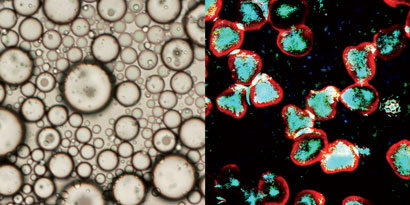UK researchers have modified plant spore microcapsules to take up to three and a half times their own weight in oil by a simple mixing process, giving them potential as natural oil-spill clean-up materials.
Grahame Mackenzie at the University of Hull and colleagues at Sporomex, a company that deals in micro-encapsulation for the pharmaceutical, food, cosmetics and personal care industries in Hull, extracted the outer layer of Lycopodium clavatum (clubmoss) spores, removed the inner contents using a simple, non-toxic process and modified the surface functional groups to make them more lipophilic. They then put the microcapsules into an oil in water emulsion, shook it by hand for 15 seconds, and filtered the microcapsules out to leave an oil-free sample. The microcapsules could be used two or three times without a change in oil recovery efficiency, which the team attributed to the high strength of the sporopollenin polymer in the spore walls.
‘The advantage over conventional methods, for example phase separation paper or simple solvent extraction, is that the emulsion is simply mixed with the shells and then filtered, which is more rapid,’ says Mackenzie. Compared to other oil remediation methods, he says, ‘the spores are a natural material, are very robust and have a consistent size, making them easy to filter’.

Sporopollenin is also known to be very elastic and so the group tested the release of oil from the microcapsules under prolonged friction. They found that the oil could be released slowly over short time periods, indicating that the microcapsules could be used as delivery vehicles in the pharmaceutical and cosmetic industries.
‘A major breakthrough is the ability to evacuate the spores without toxic solvents,’ says Miriam Rafailovich, an expert in nanoscale materials engineering at Stony Brook University, US. However, she says that ‘since these spores can be allergens in their native form, the interactions of these processed capsules with higher organisms will need to be tested’.
Mackenzie considers one drawback to be ‘the high cost and lack of large-scale availability’ of the spores, however he adds that ‘research is ongoing and applications are being explored by various companies’.
Thibaud Coradin of the materials and biology team at the College of France in Paris says that the approach ‘should be highly inspiring for the future identification and processing of biocapsules’.
Sequestration of edible oil from emulsions using new single and double layered microcapsules from plant spores
Alberto Diego-Taboada, Priscille Cousson, Elodie Raynaud, Youkui Huang, Mark Lorch, Bernard P. Binks, Yves Queneau, Andrew N. Boa, Stephen L. Atkin, Stephen T. Beckett and Grahame Mackenzie
DOI: 10.1039/C2JM00103A
Read the original Chemistry World article here










